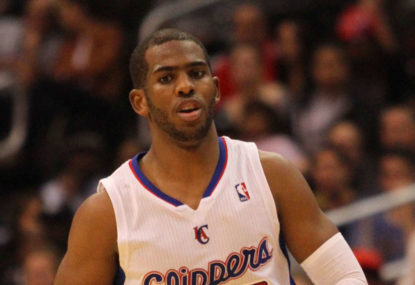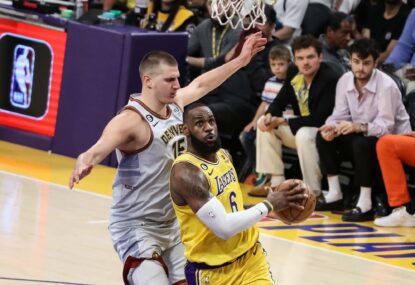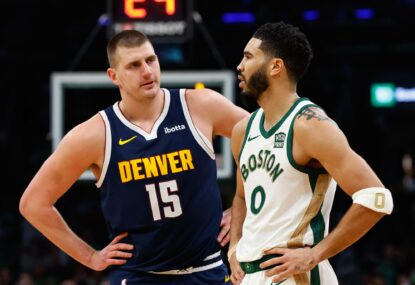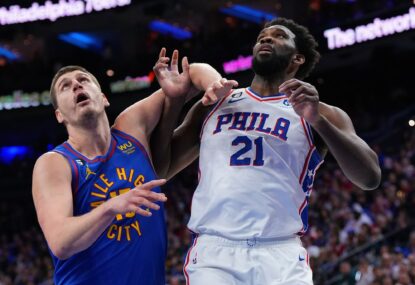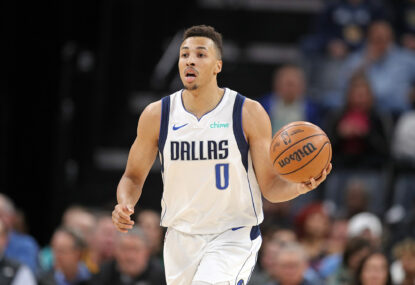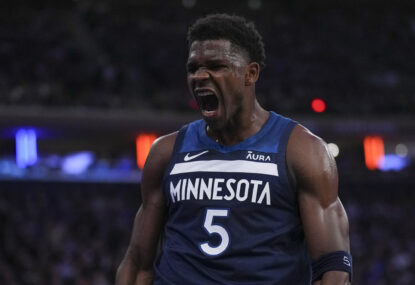It seems like the post-apocalypse is not limited to Mad Max: Fury Road, because we live in a world where Josh Smith just led the Houston Rockets to the Western Conference Finals.
The beauty and tragedy of the NBA is that it tends to make a lot of sense. The grind of a two-month postseason and the need to win four best-of-seven series generally means that the better teams triumph and Cinderella has to wait at the door.
The structure of the NBA playoffs eschews fairy-tale underdog title runs for universal order and the law of averages. But every once in a while there’s a series that defies logic and raises its middle finger to this sense of order.
Every once in a while there’s Rockets-Clippers.
The narratives in professional sports have a habit of attaching themselves to stars and that’s why the resounding story to come out of Rockets-Clippers will be this: Chris Paul still hasn’t made the Conference Finals, and to a lesser extent, neither has Blake Griffin.
But the Clippers didn’t lose this series because Blake Griffin and Chris Paul don’t have what ‘it’ takes (whatever ‘it’ may be). They lost because their excellent coach is also their terrible general manager, and JJ Redick, Jamal Crawford, Matt Barnes and Austin Rivers couldn’t a hit a shot in the last three games.
The Clippers are a brilliant basketball team, but in a league where you generally need at least eight good players, L.A. only has six.
Ultimately, what this series came down to is the fact that Josh Smith and Corey Brewer, who shot 31.6 per cent and 26.8 per cent respectively from deep in the regular season, went 10 for 21 from three (48%) over the last three games. On the other hand, J.J. Redick and Matt Barnes, 43.7 per cent and 36.2 per cent from three this season, shot 8 for 39 from behind the arc (21%) in the final three Clippers losses.
There are obviously other reasons behind the Rockets’ victory – Pablo Prigioni literally becoming a secondary Argentinian Pope for a stretch during the second half of Game 7 is one of them – but this discrepancy is the main one. Smith and Brewer turned into Kyle Korver for a week while Redick and Barnes turned into drunk Rajon Rondo.
The Clippers aren’t going home because Chris Paul doesn’t know how to win. To the contrary, Paul has a Ph. D in winning, with the San Antonio series his thesis.
They’re going home because Josh Smith put on his Darth Vader costume for 10 minutes at the end of Game 6 and whispered ‘Blake, I am your daddy’.
Basketball is fickle.
Unfortunately, the Clippers likely won’t content themselves in the knowledge that they were the victims of a statistical aberration. As lucky as Houston may have been, give them a tonne of credit. Their season was in a coffin after Game 4, but like Uma Thurman in Kill Bill: Volume 2 they had the heart and conviction to fight out of it.
It’s hard to imagine such a violent swing from ecstasy to agony in the context of two playoff rounds. They went from heaven to hell, via Texas, in a fortnight.
The Clippers showed so much heart, fight and resolve to climb back from 3-2 against San Antonio, and pull back a fourth quarter deficit in Game 7. The narrative was that they’d climbed over the hill and made the proverbial leap.
All that goodwill was undone in the fourth quarter of Game 6 against the Rockets. No statistical anomaly will ever be able to vindicate that 40-15 12-minute period which resembles a comfortable service game in tennis more than the most important quarter of your basketball season.
So, what’s the narrative about the Clippers? Are they the resilient heroes who ‘made the leap’ in Round 1 and then fell victim to fatigue? Or are they the Round 2 chokers who just got lucky against an aging, injured San Antonio team? The answer, of course, is that they’re neither, and they’re both.
The narrative of sport does not follow a script. We write the script retrospectively, and try to awkwardly fit all the events into it. If Tony Parker doesn’t miss a point blank floater over Redick with two minutes to go in Game 7, then the Spurs likely win the series and it’s ‘same old Clippers’. If Josh Smith doesn’t confuse himself for Magic Johnson with a three-point shot in the fourth quarter of Game 6 then L.A. is headed to the Conference Finals.
Ultimately, amidst all the noise and contradictions, we’re only left with one narrative about this Clippers postseason that makes sense: the brilliance of Chris Paul.
No rational person can blame Paul for the Clippers collapse. In the final three Clippers defeats, the maestro put up 20-10s in each game with astounding efficiency. Still dealing with a soft-tissue injury which had him on the sidelines less than a fortnight ago, Paul played 86 minutes in the final two games. He was gallant to the last second.
The real tragedy of the Clippers loss has little to do with the team or the franchise (they’re the Clippers, remember? This is what happens). It’s the fact that Paul’s transcendent postseason is at risk of being consigned to the lower drawers of history. As basketball fans, we can’t let this happen.
On the day that Mayweather fought Pacquiao, Chris Paul was the toughest professional athlete in North America. His Game 7 against San Antonio stands among the gutsiest, most incredible performances ever seen on a basketball court.
As much as sport may not follow a narrative, Chris Paul was writing his own script that day, and he wasn’t going to let anyone change the ending he had in mind. Not Tim Duncan, not Gregg Popovich, and not 45 years of Clipper fatalism.
It was a performance that not only echoes, but stands alongside Isiah Thomas’ sprained ankle game in the 1988 finals – and that’s the greatest compliment you can bestow upon a point guard.
For all the drama and excitement of this year’s playoffs, it hasn’t been especially well played. Cleveland-Chicago was like watching a python slowly devour a bird – unquestionably compelling but largely repugnant.
Golden State-Memphis was non-competitive after three games and for all its twists and turns, Houston-L.A. had six of its seven games decided by double digits, and the one game that wasn’t was arguably the least interesting match in the series.
Now we’re left with a Conference Finals featuring one crippled team playing one badly out of form team, and another that has gentleman’s sweep written all over it.
Of course, one of these series, or the one that follows, is likely to throw up a surprise, a new unexpected narrative. That’s the nature of sport, and the delight of ‘unscripted’.
Until then though, we’ll have the story of Chris Paul and the night he toppled the defending champions on one good leg. And in spite of all the mayhem that succeeded it, the Los Angeles Clippers still have that story too.





























































































